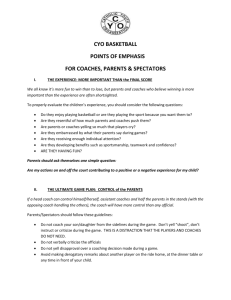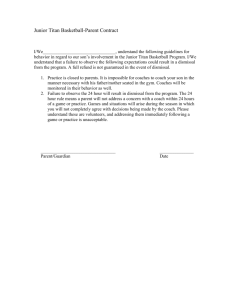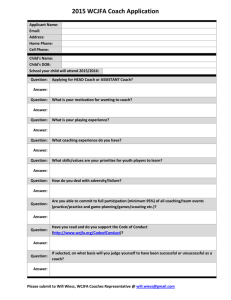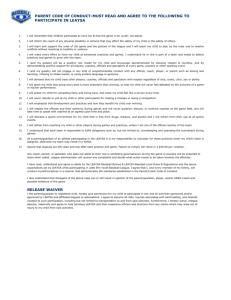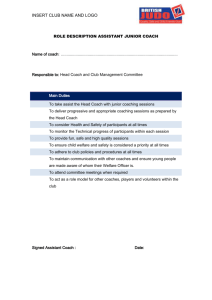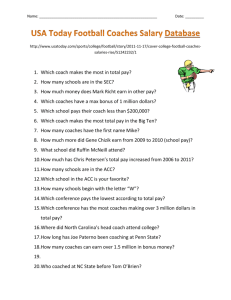Handbook - Pembina Trails School Division
advertisement
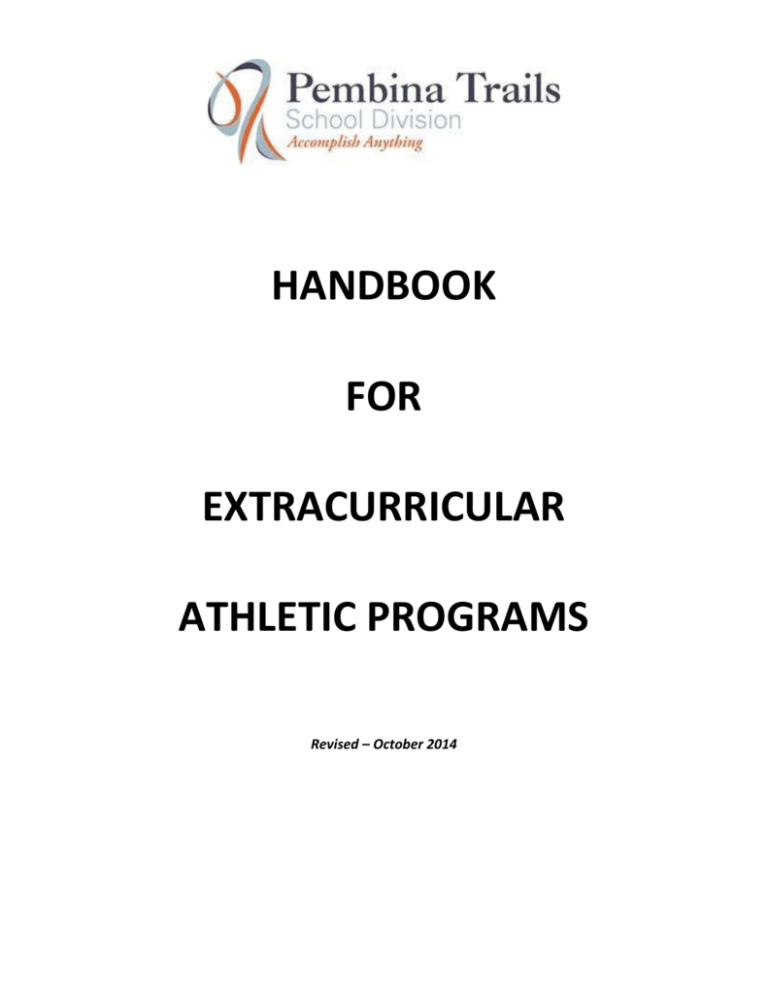
HANDBOOK FOR EXTRACURRICULAR ATHLETIC PROGRAMS Revised – October 2014 HANDBOOK FOR EXTRACURRICULAR ATHLETIC PROGRAMS TABLE OF CONTENTS INTRODUCTION ....................................................................................................Page 3 A. FAIR PLAY CODES FOR SCHOOL ATHLETICS ..............................................................Page 4 B. PROGRAM VALUES ...............................................................................................Page 5 B. ROLES AND RESPONSIBILITIES 1. 2. 3. 4. 5. 6. Principal Physical Education Staff School Contact Coach Team Supervisor Home Game Supervisor ..............................................................................Page 6 ..............................................................................Page 6 ..............................................................................Page 6 ..............................................................................Page 7 ..............................................................................Page 8 ..............................................................................Page 8 C. QUALIFICATIONS & BELIEFS OF COACHES ...................................................................Page 9 D. REPORTING OF INAPPROPRIATE CONDUCT ...............................................................Page 9 E. SAFETY/EMERGENCY PROCEDURES ...........................................................................Page 10 F. EXTENDED FIELD TRIPS AND EXCURSIONS .................................................................Page 10 G. TRANSPORTATION GUIDELINES ..................................................................................Page 10 APPENDICES: Policies & Guidelines A. POLICY IJOA Policy, Regulation, Exhibit 1, Exhibit 2 B. POLICY GBJC (R, E) Policy, Regulation, Exhibit C. POLICY JLC Policy, Regulation, Exhibit Student Transportation in Private Vehicles Day Field Trips and Excursions Extended Field Trips and Excursions School Volunteers Exhibit includes Child Abuse and Criminal Record Check forms Student Health Services and Requirements Regulation includes Return to Learn/Return to Play protocol. Exhibit includes Advisory of Head Injury Parent form APPENDICES: Forms D. ACCIDENT INCIDENT REPORT (Download) E. PLEDGE OF CONFIDENTIALITY (Download) F. VOLUNTEER AGREEMENT FOR SCHOOL ATHLETIC PROGRAMS (Download) Revised – October 2014 2 INTRODUCTION The Handbook for Extracurricular Athletic Programs was developed to assist staff and volunteers with the development of a safe and positive extracurricular experience for their students. This handbook reviews the roles and responsibilities for school staff, coaches, and school administrators as they pertain to the interschool athletic program. Also included in the Handbook are the Divisional policies specifically related to transportation, field trips, and security checks for volunteers. Some additional forms are included to assist the volunteer coach with their team planning and preparation. An Ad Hoc Committee (Bob Dawson, Murray Brown, Bill Smith, Ed Green, Sharon Richmond, and Wayne Thompson) was responsible for the construction and approval of the final document. A review committee (Lucille Benoit, Sharon Jasper, Darren Juby, Xavier Abrioux, and Nick Dyck) was established in 2003. The purpose of the review was to edit and revise the Handbook in order to make it relevant to the newly amalgamated Pembina Trails School Division. If you have any questions on the policy references, please contact your school administrator for further information. Both councils (Grades 4 - 6 & Grades 7 - 9) of the Pembina Trails Athletic Association (PTAA) have bylaws that outline specific rules and regulations for each sport. Copies of these bylaws may be obtained from your physical education staff or online at: Thank you for your involvement with our student athletes. Your expertise and time are greatly appreciated. Acknowledgements These guidelines and procedures were developed using the following resources: National Coaching Certification Program (NCCP) - Level 1 & 2 Theory Manuals Fair Play; Resource Manual for Coaches St. James-Assiniboia Athletic Conference (SJAAC) - Bylaws Assiniboine South Junior High Athletic Association (ASJHAA) - Program Guidelines Manitoba High Schools Athletic Association (MHSAA) Freedom of Information and Protection of Privacy Act (FIPPA) Personal Health Information Act (PHIA) Revised – October 2014 3 FAIR PLAY CODES FOR SCHOOL ATHLETICS Player’s Code Parent’s Code 1. 2. 3. 4. 5. Play for the “fun of it”. Play by the rules. Respect the official’s decision. Respect your opponents. Work equally hard to improve your own skills as well as your team’s. 6. Control your temper. 7. Cooperate with your coach, teammates, and opponents. Coach’s Code 1. Be reasonable in your demands on your players’ time. 2. Providing all participants with equitable playing time 3. Teach players to play by the rules. 4. Respect your opponents, as well as the judgment of the officials. 5. Never ridicule or yell at the players for making mistakes or losing. 6. Check the equipment and facilities for safety. 7. Length of practices should be based on the maturity level of the players. 8. Be a good role model and be generous with your praise when it is deserved. 9. Keep informed on sound coaching principles and the growth and development of children. 1. Do not force an unwilling child to participate in sports. 2. Children are involved in organized sports for their enjoyment not yours. 3. Encourage your child to always play by the rules. 4. Teach your child that honest effort is as important as victory, and to accept the outcome of a game without undue disappointment. 5. Help your child work towards skill improvement and good sportsmanship. Never ridicule or yell at your child for making mistakes or losing. 6. Applaud good play by all. 7. Respect the judgment of the officials. 8. Support all efforts to remove verbal and physical abuse from children’s sporting activities. 9. Recognize the importance and value of volunteer coaches. Revised – October 2014 4 HANDBOOK FOR EXTRACURRICULAR ATHLETIC PROGRAMS A. PROGRAM VALUES School athletic programs in our division support the pursuit of excellence in an organized setting that is appropriate to the general developmental nature of the students involved. School athletic programs are considered a valuable part of the total school program and are supported by the Division. All coaches assume a tremendous responsibility when they volunteer to become a part of the extracurricular program of a school. Every coach is responsible for the management of their own behaviour and the team's behaviour in all events when representing their school and should therefore receive and become familiar with the PTSD Principled Coaching Practices Reference Guide for coaches, administrators, and educators. Positive attitudes and behaviours, fair play ideals, and game skills need to be developed and reinforced to foster the competitive spirit that demonstrates good sportsmanship (see Fair Play Codes for School Athletics on the previous page). The Division believes that for: Grade 4, 5, and 6 - The emphasis needs to be on fair play, sportsmanship, and character building. - The programs need to foster the development of positive attitudes. - All participants play an equal amount of time. - No game scores are be kept during team competitions and results from individual competitions will be used to set personal goals for improvement. Grade 7 - The fundamental belief at this developmental stage is that all students should be given the opportunity to play with equal time. - It is important to provide students with a transition to higher levels of skill development. - It is important to promote and encourage the enthusiasm to play sports and to be physically active as a way of life. Grade 8 and 9 - It is important to increase the quality of the coaching while maintaining a high level of participation. - Every player should play in every game. The playing time of each player should be significant. The amount of playing time is at the discretion of the coach with the understanding that playing time may be adjusted due to extenuating circumstances (e.g. behaviour, attendance, etc.). - Coaches must make players aware of the circumstances that may affect their playing time. - Students are still developing their skills and need to be given the opportunity demonstrate the acquisition and application of these skills. - Although divisional banners are awarded for team competitions it is important to remember that students still want to PLAY and have FUN. Revised – October 2014 5 B. ROLES AND RESPONSIBILITIES 1. Principal 1.1 A certified teacher should coach extracurricular athletic teams wherever possible and feasible. Where this is not possible, and depending on the nature of the activity, number of students involved, time of day, etc., qualified volunteers may coach. Designate a certified school teacher as the school contact for outside coaches. 1.2 Meet with the outside coach and welcome him/her to the school. 1.3 Ensure that a staff member(s) is/are supervising at home games. This does not include the persons who are involved with coaching or team supervision duties. 1.4 Provide team supervision. i) Upon approval of the principal, an outside, adult coach may be designated as a responsible (supervisor) and does not require a supervising staff member. The school contact will monitor and respond as required. ii) If the volunteer coach is under 18 years of age, a supervising teacher (supervisor) must be in attendance at all team activities. When traveling to another school, the supervisor should identify himself or herself to the host supervisor. (Refer to 5. for specific responsibilities of the Team Supervisor) 2. Physical Education Staff 2.1 Distributes the Handbook to all coaches and school contacts and to ensure that they receive an orientation prior to the beginning of the season. The orientation of the coach should include: expectations, guidelines, pertinent policy(ies) of the Division vis-a-vis extracurricular activities, pupil safety, pupil conduct, coach’s conduct, procedures to be followed in an emergency. An outside coach must complete a Volunteer Agreement form, which will confirm that the orientation has taken place. (IMPORTANT - A copy of this form must be kept at the school and be available upon request.) 2.2 Provides coaches with practice schedules, league schedules, tournament information and planning, team progress, and Association Bylaws and Guidelines at each level. 2.3 Review personal safety and appropriate behaviour practices with coaches. This will include common practices such as: not having discussions with individual students behind closed doors; not entering opposite gender change rooms unless they are assigned; not allowing players to change tops at the bench; not transporting individual students. Other practices may be discussed as deemed necessary. 2.4 Provide direction regarding the mandatory Respect in Sport training. 3. School Contact 3.1 Each volunteer coach who is not a teacher (outside coach) must have a designated school contact. The school contact needs to be a certified teacher working in the school. The school contact needs to: Revised – October 2014 6 i) Have regular communication with the volunteer; ii) be readily available in the building or by telephone to provide consultation/ advisement during the time(s) when the volunteer has care and charge of pupils; iii) provide alternate contact phone numbers in the form of a phone chain; iv) assist with informing parents of any team arrangements. 4. Coach 4.1 Ensure that the team composition is based upon the school division’s guiding principles, appropriate to grade level. Please discuss procedures with a Physical Education staff member. 4.2 Conduct a parent meeting or provide parents with team information/guidelines prior to the first competition. (grade 8 or above) 4.3 Become familiar with all relevant divisional policies and guidelines. (e.g. confidentiality, transportation, extended field trips) 4.4 Review with the school administration and/or physical education staff the emergency action plan. 4.5 Maintain accurate player information (e.g. name, age, date of birth, phone number, uniform number). Coaches should have this information available to them at all times, as well as copies of the Student Accident Incident Report form and the Advisory Notice of Head Injury form for immediate use. 4.6 Promote and practice safety during practice and play. 4.7 Be a good role model and instill in participants the values of sportsmanship and fair play with respect to the following five fair play points: and league Respect the rules of the game Respect the officials and their decisions Respect the opponent Providing all participants with equitable playing time Maintain your self-control at all times 4.8 Respect and follow good personal safety and appropriate behaviour practices for the benefit of the athletes and one's own integrity. 4.9 Remain with his/her athletes and/or students until they are out of that school or until appropriate supervision is obtained. Revised – October 2014 7 5. Team Supervisor (when a coach is under 18 years of age) 5.1 Ensure that the team composition is based upon the school division’s guiding principles, appropriate to grade level. Please discuss procedures with a Physical Education staff member. 5.2 Know and coordinate with the physical education staff the league schedule and team/school expectations. 5.3 Establish a reporting/consulting mechanism with the coach. 5.4 Be informed of all supervision and transportation policies of the Division as well as emergency procedures. 5.5 Maintain accurate records of registration forms (name, age, date of birth, phone number, medical numbers, uniforms, practice plans, accident report forms) are at all practices and games. (Reminder: Some player information is confidential and protected under FIPPA and PHIA Guidelines.) 5.6 Practice and promote general and personal safety at all times. 5.7 Support the coach in acting appropriately with all officials. 5.8 Support the coach in promoting the values of sportsmanship and fair play. 5.9 Supervise by sitting on the bench during games. 5.10 Remain with his/her athletes and/or students until they are out of that school or until appropriate supervision is obtained. 5.11 Acts as a liaison with the school contact and administration as required. 6. Home Game/Site Supervisor The following are recommended guidelines for the home game supervisor, and their associated responsibilities. A school may modify these guidelines to suit its own situation and special circumstances. 6.1 Be responsible for maintaining order. 6.2 Periodically check parts of the building to which the students have access. 6.3 Students are not allowed to loiter in the hallways. 6.4 Teachers are advised to detain any student who has evidently been using illegal substances, and contact their parents to have him/her picked up. If parents are unavailable, police contact is advised. The host school supervisor will make a report to his/her building administrator. 6.5 If there is a problem regarding student control (e.g. fighting, damage to school, etc.), the host school supervisor will make a report to his/her building administrator. The Revised – October 2014 8 administrator(s) from each school should discuss the incident and decide upon an appropriate course of action. 6.6 The supervising teacher may be asked to provide relevant information regarding the nature and circumstances of a complaint or protest. 6.7 Remain in the activity area until the students/athletes are out of that school or until appropriate supervision is obtained. 6.8 At the senior high level, a supervising teacher from the school must accompany the team to any tournament outside the city limits in addition to the outside coach. This is in accordance with the MHSAA (Manitoba High Schools Athletic Association) guidelines. 6.9 For an overnight stay, provision must be made to have an adult chaperone of the same team gender, where the coach is not the same gender as the team. C. QUALIFICATIONS AND BELIEFS OF COACHES 1. Believes in the fair play code for school athletics. 2. Has a good knowledge of the sport and training methods. It is desirable that coaches have a minimum of Level 1 NCCP in that sport or equivalent and basic first aid knowledge. 3. Understands the place and purpose of extracurricular athletics in the educational system. 4. Must provide Respect in Sport certification number and date of certification to the school/division (PE Consultant) for registration. 5. Child Abuse Registry (form available at PTSD Board Office) and Criminal Record (Public Safety Building – 151 Princess Street) checks are required by all adult volunteer coaches according to Policy GBJC. The cost is paid for by the Division. D. REPORTING OF INAPPROPRIATE CONDUCT - Standard of Behaviour Document A site supervisor will respond to any behaviour of players, coaches, or parents that is deemed inappropriate. The site supervisor, coach, team supervisor or school contact will report any inappropriate behaviour to their principal when deemed necessary. The principals of the schools will contact the parties involved so that the complaint can be addressed and resolved. A formal protest/complaint may also be submitted in the following manner: 1. A formal protest/complaint regarding inappropriate conduct must be sent to the administrators of the schools in question within 48 hours of the event. The administrators will inform the physical education staff member in charge of the extracurricular activity of the protest/complaint. The administrators, coaches, and physical education staff should be able to deal with the protest/complaint at this level. A formal complaint requires that the administrator advise the complainant of the action taken. Revised – October 2014 9 2. The Physical Education Consultant and the convenor of the sport in question will be advised that a formal protest/complaint has been made, including the general nature of the protest/complaint. E. SAFETY/EMERGENCY PROCEDURES 1. Be aware of student health services and requirements in Divisional Policy JLC. 2. Be aware of existing medical information for each player and respect the confidentiality of this information. (FIPPA and PHIA Guidelines; Pledge of Confidentiality) 3. Where a student becomes ill or injured, use first aid measures immediately and contact the parent or guardian at the earliest possible opportunity. 4. Have phone numbers and medical numbers with you in case of emergency. 5. Always have first aid supplies readily available. When traveling to another school the team will take a first aid kit. 6. Report the injury to the principal and complete a School Accident Incident Report form. 7. In the case of a head injury refer to Divisional Policy JLC, Regulations, and Exhibit for the Advisory Notice of a Head Injury form. 8. Follow up with a parent when a student is injured. F. EXTENDED FIELD TRIPS AND EXCURSIONS (I.E. TOURNAMENTS) 1. Refer to divisional policy for specific details and procedures on submitting a "Notice of Intent" for any planned team activity that includes an overnight stay. G. TRANSPORTATION GUIDELINES 1. Refer to Policy IJOA for Student Transportation in Private Vehicles, and Day Field Trips and Excursions. Revised – October 2014 10

